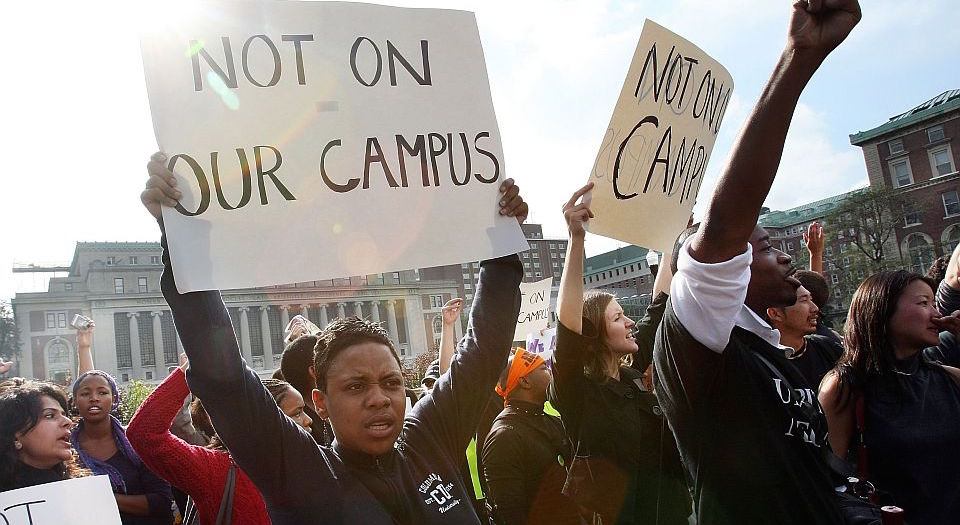
Long-read
Taking on the snowflakes
Claire Fox’s rousing new book digs deep into the genesis of generation snowflake.
Want unlimited, ad-free access? Become a spiked supporter.
In I Find That Offensive, Claire Fox’s pithy, punchy contribution to Biteback’s ‘Provocations’ series, she appeals to the members of ‘generation snowflake’ to cast off their bubble wrap and embrace the liberating responsibilities of adult life.
Fox is not simply having a go at the younger generation, although there is good reason to, from students No Platforming anyone they disagree with, to their obsession with microaggressions. Rather, she wants to know ‘why?’. Why are they taking offence on such an epic scale? Why are they banning people from campus? Why are they are claiming to be ‘triggered’ by words? And to answer these questions, she digs at the roots of youngsters’ fragility, and explores the wider culture of victimhood.
Fox observes, for example, how many young people today acquire a perverse authority through the adoption of an ‘oppressed’ status. The result is that even mild criticism of their beliefs is deemed tantamount to hate speech, which effectively gives the beliefs of the self-proclaimed victims special immunity. Meanwhile, those without sufficient victim status try to compensate by overzealously empathising with acknowledged victim groups in the hope that some of the moral lustre of others’ victimhood will rub off on them.
Victimhood’s high social currency has led to what one blogger describes as the ‘cult of oppression chic’, a situation in which some are actually inventing their victim identities. For example, Fox cites the case of prominent Black Lives Matter campaigner Shaun King, the scourge of white privilege and a self-defined ‘person of colour’. He was disgraced when his own supporters conceded that his birth certificate shows he is white. Then there was the bizarre story of Rachel Dolezal, who built her entire career as an African-American civil-rights activist despite being primarily of European origin.
So who is to blame for generation snowflake, in all its victimhood-seeking, offence-taking inglory? Fox fingers us, its elders. We have socialised these youngsters in a culture of health and safety, in which we catastrophise life’s challenges and obsess about health scares and child protection. And it’s this overprotection of children, their immersion in our risk-averse culture, in which we now see threats and suspect abuse everywhere, argues Fox, that has blurred the line between physical and psychological harm.
Until very recently, liberals followed 19th-century philosopher John Stuart Mill’s definition of ‘mental harm’. He defined it as anything that impairs an individual’s development, for example, depriving children of an education. He also understood harm as something that happens against our will.
For Mill, then, offensive words or sentiments would not have qualified as causes of ‘mental harm’. For example, when we find someone offensive we can avoid them and continue our lives unimpaired. As for today’s claim that we are harmed by the mere existence of people who live in ways of which we disapprove, Mill’s response is that not being offended is less important than not being physically injured, detained, or criminally deceived. Fox urges her readers to get back to this more robust understanding of harm – a definition that leaves room for legitimate parental discipline and proper academic pressure.
But there are considerable obstacles barring a return to this definition of harm. Children’s charities and NGOs are constantly broadening definitions of abuse, actively encouraging children to deem as abusive, ‘being pressurised or manipulated into making decisions’, or being ‘pushed too hard’. Widening the scope of bullying, and therefore victimhood, to include everything from ‘spreading rumours’ to ‘just being ignored’ creates an environment in which kids are discouraged from developing coping mechanisms, and are taught to seek psychological ‘support’ when faced with any challenge or criticism
So, instead of helping young people to put unpleasant experiences into perspective, we have been encouraging children to over-react, to become traumatised by minor slights. It is no wonder that young people now head off to college, obsessed with their psychological wellbeing, and conscious of themselves as vulnerable and victimised. As Fox writes, we have pathologised what were once considered basic experiences of student life, from being broke, to staying up all night to get an essay finished. Disappointment, stress and frustration are no longer integral parts of life, of growing up; they’re sources of mental distress and illness.
An insidious paternalism has also eaten into youngsters’ everyday life. Childrens’ informal activities are organised and supervised; ‘free time’ is structured and monitored; ‘helicopter parents’ encourage children to be reliant on outside intermediaries. The space in which young people can develop their independence has shrunk. Instead, young people are encouraged to believe that they are empowered by dependency on external agencies and institutions. Their diminished sense of responsibility and autonomy ties them, as if with an umbilical cord, to external authorities. It’s not just their liberty that is undermined; their capacity to become autonomous is stunted, too.
Fox also criticises the transformed relationship between teachers and pupils. Protecting pupils’ self-esteem is now paramount – their ‘student voice’ must be heard. Teachers are told that in order to engage their pupils, all subject matter must relate to pupils. This demand to treat young people’s views with unconditional respect, writes Fox, to pander to their experiences and prejudices, ‘effectively destroys the intergenerational duty of passing on knowledge, setting boundaries for behaviour and the broader task of socialisation’. The necessarily unequal relationship between the teacher and student, based as it is on a relationship between one with knowledge, and one without, is eclipsed. As a result, students never learn to cope with disappointment or accept criticism.
Fox concludes her book with a rousing, direct address to generation snowflake. The harsh reality, she says, is that its rebellion is illusory. Authentic rebels need the kind of moral autonomy and independence that is achieved through genuine intellectual argument. Young people are not challenging the mainstream, says Fox; they are embracing it, and playing to a tee the role of the vulnerable victim in need of outside intervention and support.
What then is to be done? The young will need courage to wage war against those forces that stress security over liberty and free speech. They will need to develop backbones. And, above all, they will need to grow up.
Terri Murray is director of studies at Hampstead College of Fine Arts & Humanities, London. She is the author of Thinking Straight About Being Gay: Why it Matters if We’re Born That Way (2015). (Buy this book from Amazon(UK).)
‘I Find That Offensive’, by Claire Fox, is published by Biteback Publishing. (Order this book from Amazon(UK).)
You’ve hit your monthly free article limit.
Support spiked and get unlimited access.
Support spiked and get unlimited access
spiked is funded by readers like you. Only 0.1% of regular readers currently support us. If just 1% did, we could grow our team and step up the fight for free speech and democracy.
Become a spiked supporter and enjoy unlimited, ad-free access, bonus content and exclusive events – while helping to keep independent journalism alive.
Monthly support makes the biggest difference. Thank you.







Comments
Want to join the conversation?
Only spiked supporters and patrons, who donate regularly to us, can comment on our articles.